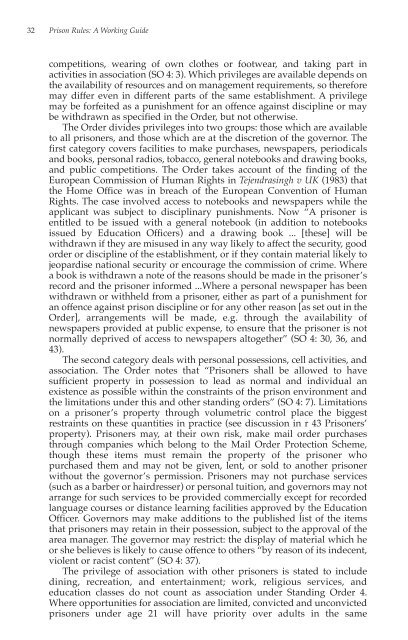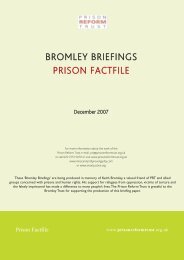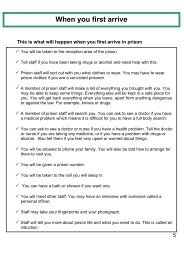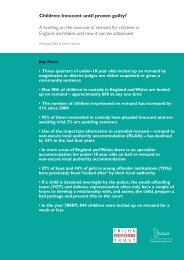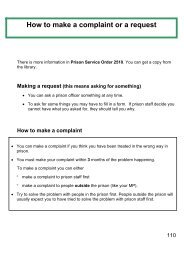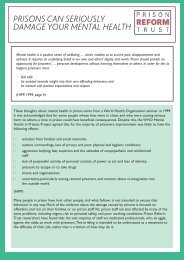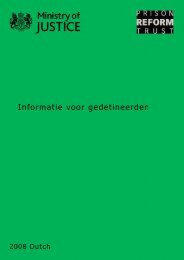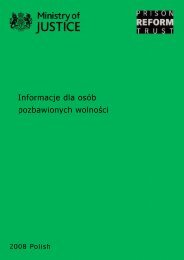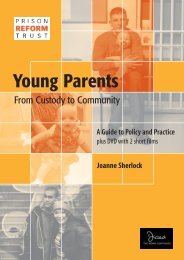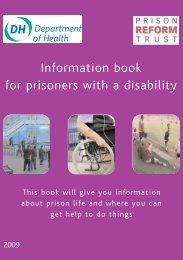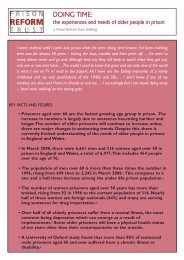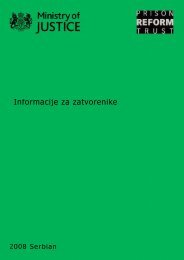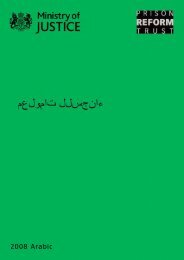Prison Rules: A Working Guide, The Millenium Edition
Prison Rules: A Working Guide, The Millenium Edition
Prison Rules: A Working Guide, The Millenium Edition
- No tags were found...
You also want an ePaper? Increase the reach of your titles
YUMPU automatically turns print PDFs into web optimized ePapers that Google loves.
32 <strong>Prison</strong> <strong>Rules</strong>: A <strong>Working</strong> <strong>Guide</strong>competitions, wearing of own clothes or footwear, and taking part inactivities in association (SO 4: 3). Which privileges are available depends onthe availability of resources and on management requirements, so thereforemay differ even in different parts of the same establishment. A privilegemay be forfeited as a punishment for an offence against discipline or maybe withdrawn as specified in the Order, but not otherwise.<strong>The</strong> Order divides privileges into two groups: those which are availableto all prisoners, and those which are at the discretion of the governor. <strong>The</strong>first category covers facilities to make purchases, newspapers, periodicalsand books, personal radios, tobacco, general notebooks and drawing books,and public competitions. <strong>The</strong> Order takes account of the finding of theEuropean Commission of Human Rights in Tejendrasingh v UK (1983) thatthe Home Office was in breach of the European Convention of HumanRights. <strong>The</strong> case involved access to notebooks and newspapers while theapplicant was subject to disciplinary punishments. Now “A prisoner isentitled to be issued with a general notebook (in addition to notebooksissued by Education Officers) and a drawing book ... [these] will bewithdrawn if they are misused in any way likely to affect the security, goodorder or discipline of the establishment, or if they contain material likely tojeopardise national security or encourage the commission of crime. Wherea book is withdrawn a note of the reasons should be made in the prisoner’srecord and the prisoner informed ...Where a personal newspaper has beenwithdrawn or withheld from a prisoner, either as part of a punishment foran offence against prison discipline or for any other reason [as set out in theOrder], arrangements will be made, e.g. through the availability ofnewspapers provided at public expense, to ensure that the prisoner is notnormally deprived of access to newspapers altogether” (SO 4: 30, 36, and43).<strong>The</strong> second category deals with personal possessions, cell activities, andassociation. <strong>The</strong> Order notes that “<strong>Prison</strong>ers shall be allowed to havesufficient property in possession to lead as normal and individual anexistence as possible within the constraints of the prison environment andthe limitations under this and other standing orders” (SO 4: 7). Limitationson a prisoner’s property through volumetric control place the biggestrestraints on these quantities in practice (see discussion in r 43 <strong>Prison</strong>ers’property). <strong>Prison</strong>ers may, at their own risk, make mail order purchasesthrough companies which belong to the Mail Order Protection Scheme,though these items must remain the property of the prisoner whopurchased them and may not be given, lent, or sold to another prisonerwithout the governor’s permission. <strong>Prison</strong>ers may not purchase services(such as a barber or hairdresser) or personal tuition, and governors may notarrange for such services to be provided commercially except for recordedlanguage courses or distance learning facilities approved by the EducationOfficer. Governors may make additions to the published list of the itemsthat prisoners may retain in their possession, subject to the approval of thearea manager. <strong>The</strong> governor may restrict: the display of material which heor she believes is likely to cause offence to others “by reason of its indecent,violent or racist content” (SO 4: 37).<strong>The</strong> privilege of association with other prisoners is stated to includedining, recreation, and entertainment; work, religious services, andeducation classes do not count as association under Standing Order 4.Where opportunities for association are limited, convicted and unconvictedprisoners under age 21 will have priority over adults in the same


